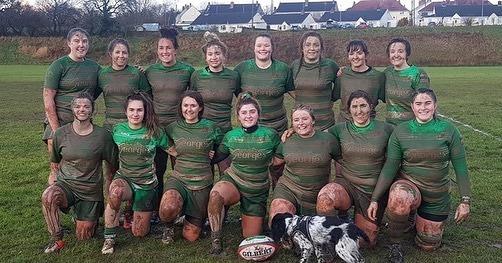Whitland player Natalie Walsh speaks candidly to Fraser Watson
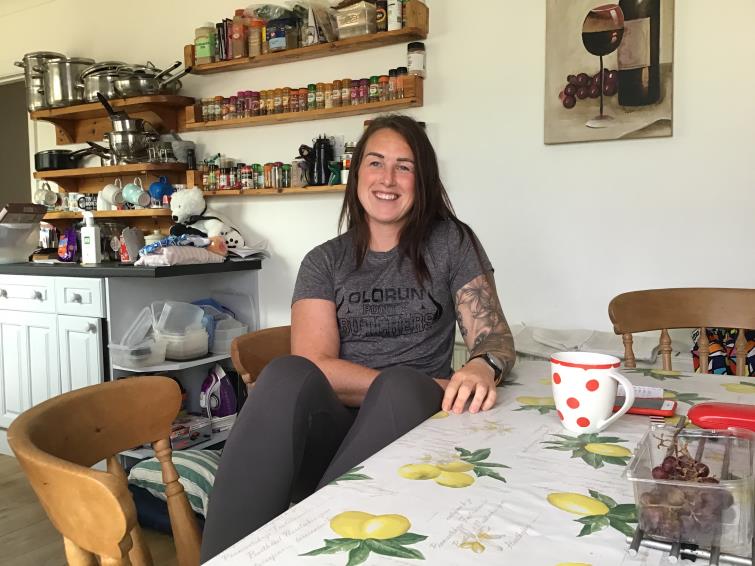
The notion of equality in sport is a debate that currently burns brightly.
Opportunities for women have increased and yet at the same time, remain supressed. Calls for increased funding, exposure, and facilities can be heard loud and clear, but the reality is a marked differentiation between male and female athletes remains.
However, that’s not a factor that has ever restricted the mentality of Natalie Walsh. As a young girl her love of sport inevitably met barriers – her attitude was simply to go through them.
“When I played against boys at club level some wouldn’t want to tackle me because I was a girl, but in county games they didn’t care and wanted to absolutely smash you.
“They knew if you were there then you weren’t a bad rugby player.”
By that time she was 12-years-old and had been throwing an oval ball around for six years. In fact, fittingly, our socially distanced interview took place at her family home in Fishguard.
I say fittingly, as both her family and the town were major influences in her starting out in sport.
“I was down playing rugby at Fishguard by the age of six,” she recalled.
“And my brother Gavin started the same sort of time. We’ve always been a sporting family and it felt like we were all involved – my dad (Paul) played for the club and he coached us right through the ages.
“My uncles Kevin and Lynne also played and then mam (Meinir) and aunty Ange were playing with the hockey team.”
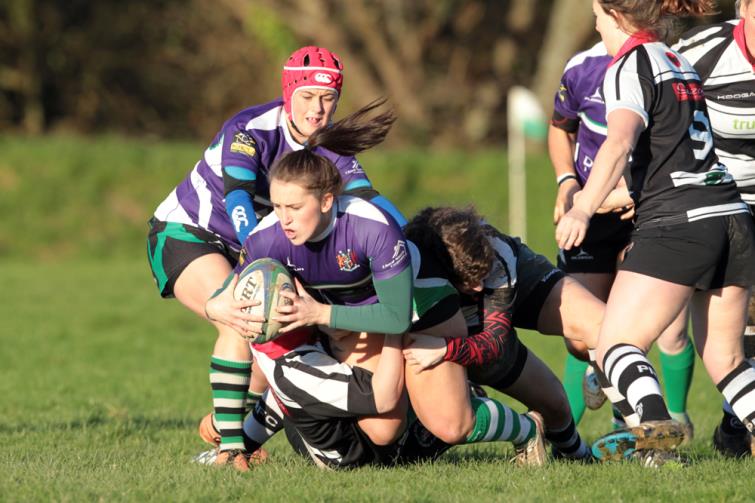
She would play for the Seagulls and then Pembrokeshire until she was 13, the age where girls were forbidden from playing with boys. But not before making an important switch which would influence her for years to come.
“As a kid I played on the wing, but in my last season with the county Steve Joseph said he wanted to play me in the back row – and I’ve been there ever since.”
But after that, finding a settled female side was hard to come by. Walsh played with Milford, Pembroke, Cardigan, Lampeter, Llanelli Wanderers and even Bridgend in the search for regular rugby, and also represented West Wales Under 16s under Alan Phillips and Kenny Davies.
By 17 though, she had done enough to catch the eyes of the Wales Under 19s selectors, and with that came even more travelling.
“All the training took place in Cardiff and we’d have to be there by 8am on a Saturday morning.
“Mam and dad would take me and Sara Davies (now working with Scarlets) and it was tough. But when they selected a squad to go to Canada I wasn’t picked – only for them to come back and the coaches tell me I should have been in the squad.
“I found that s**t really, I’d rather not have known.”
But at 19 a cap did eventually come in a game for Wales against England. She also cemented a regular starting place in the West Wales senior side under Gareth Bennett and as a pupil at Pembrokeshire College, was eligible for the Welsh Students’ team that toured Scotland.
During this time Alan Phillips and dad Paul also took charge of a senior women’s side at Fishguard but when that fizzled out, Walsh made a move that to this day, defines her time in rugby.
“Whitland had a young ladies’ team coming up to senior age and Gavin was there with the youth team too.
“So I made the switch and we travelled up there on a Thursday night. Mam was involved too and would soon become coach of the women’s side.”
Of course, women’s rugby has come on a long way in the last decade. But while there may not have been the same depth of quality when Walsh started out with The Borderettes, the rough and tumble was arguably more severe.
“It was competitive and a lot more even,” she recalled.
“The good players were more scattered around whereas now you have a team like Swansea who are so strong.
“And it was a lot more physical. Back then stamping was a thing and you’d get stood all over and the contact was a lot rougher.
“I’d go into college in the week black and blue and covered in bruises.
“But overall the game wasn’t as popular for women back then. At Whitland we seemed to have a good side and we were the only team in the county at that point, so anyone in Pembrokeshire who wanted to play had to join us.”
And it was from there the ‘good’ side Walsh referred to became a formidable one. Back to back Division 1 titles and promotion to the Women’s Premiership was achieved, and in 2013/14 came a landmark moment when they beat eventual champions Skewen (now Swansea) on route to a second placed finish.
“It was a mud bath but such a good win and a massive day for all of us.
“From when they were called Neath, to Skewen, and now Swansea they’ve always been the team to beat.
“But at the time we had developed a quality team and had so many girls involved with the Scarlets and we really took it to them.”
But with higher standards also came heartbreak. Especially in April 2015 when a last minute try by Pontyclun’s Rafiuke Taylor cost The Borderettes a place in the Welsh Cup final. There was redemption a year later as they beat the same side at the same stage, only to be hammered by Skewen in the finale in Bedwas.
“I think I actually cried after the first Pontyclun game,” admits Walsh.
“I remember it being ridiculously hot and the pitch was solid. I shouldn’t say this but in the last minute we were winning and in their 22 when a penalty that should have gone to us went the other way. From that Rafiuke went the length of the field and scored.
“It was good to actually beat them in the next season but then in the final Swansea (formerly Skewen) gave us an absolute hiding in the rain. Nothing went our way.”
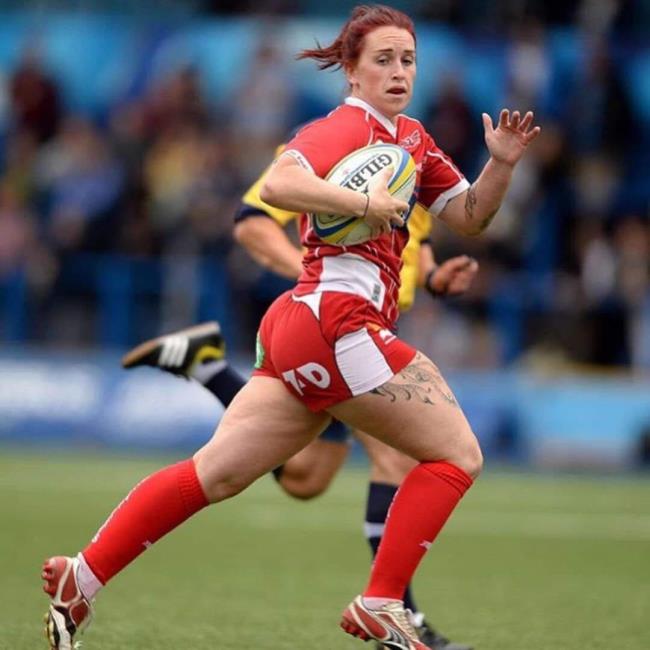
Regardless, Walsh and co could reflect on two seasons when the team undoubtedly peaked, and stood toe to toe with the best in Wales.
“It was probably the strongest two years we had at that standard. We had some great times.”
A rebuilding phase followed and with it came a Welsh Plate win in 2017/18, beating Seven Sisters in the final. But as the likes of Welsh internationals Lleucu George and Sioned Harries moved to play in England, a talented yet inexperienced crop began to come through.
It all amounted to the club making a tough, and yet realistic decision. After the most recent campaign, they voluntarily opted to drop back down to Division 1 in order to allow the youngsters to develop.
But for Walsh, who had been one of many influential figures in establishing the side as a top flight force, did that concession hurt?
“No it honestly didn’t. It’s time for us to get back to basics and start enjoying and winning games again.
“We played Pencoed away last year and that game stuck with me. They were a dirty side and I was conscious of what a young team we were.
“It was really hard for some of the girls, they were getting high tackled and all sorts and learnt that the physicality is different to under 18s.
“I thought then that as a squad we can’t enjoy being this level anymore - and we need to take a step back and regroup.”
Regardless, her heart is now tinged with green and white. And the same can be said as a big influence in the club who has been there throughout her time at Whitland – team manager Sue Davies.
“Sue is all about Whitland.
“She has put so much effort in over the years – evenings, weekends, the 15s, 18s, seniors, sorting sponsorship. Just everything.
“Now she is also heavily involved with the hub for youngsters and we’ve been lucky to have her.”
For Walsh though, it’s not just Whitland Ladies that has consumed her time.
She’s been a Scarlets regular for several seasons, throughout which period the intensity levels have risen. From playing and training at makeshift venues, she’s now represented the region at Parc Y Scarlets, Cardiff Arms Park, and St Helens. There have been some memorable clashes with the Ospreys, not to mention late night trips to Cross Hands three times a week for training.
And as well as the 15-a-side code, she’s now renowned on the 7s circuit too.
“I played with the Carmarthen Flamingoes and won a few tournaments but four years ago started playing for the Ponty Butchers.
“I’ve had some great trips with them and Dubai in particular was an amazing experience.
“First time around we lost in the final which hurt as we had been class during the tournament. The same happened the following year but still, the experience both times was something I can’t explain.
“The atmosphere, even when watching the World Series tournament afterwards, is just incredible. Beats a matchday in Cardiff hands down.”
She’s also represented the Wooden Spoon Marauders, a charity team based in England. This summer, the coronavirus pandemic has robbed her of appearing in tournaments in Amsterdam, Bournemouth and La Manga, and on this particular day she had been scheduled to play the Heart of Wales 7s in Llandiloes.
And yet, despite her rugby CV, one call particular call has never come.
As mentioned, Walsh has an Under 19s cap which by her own admission sits modestly in a food bag in the cupboard, but despite being on the periphery for so long senior selection has never materialised.
She insists this isn’t something that keeper her awake at night. But as she speaks, I sense slight bewilderment.
“I’ve been involved so many times in training squads.
“But year after year they would cut the squad and I wouldn’t make it. I’d do the fitness testing and everything but it never happened for me.
“Honestly though, it doesn’t bother me anymore. Maybe five years ago I’d have jumped at the chance to have a senior cap but I really don’t think about it now.”
One thing she does think about though, is the state of the women’s game. In some respects it has come on leaps and bounds, but that notion has been undermined recently by a struggling national side, the debacle surrounding Rowland Phillips, and a merit system for the lower leagues where points gained were based on squad numbers, and not results.
“It’s all been an absolute shambles,” she said, without hesitation.
“Before you would have your league, play home and away, and fit in the cup and regional games in.
“But now they put a block aside for regional rugby so any players not involved go weeks and weeks without rugby and it’s hard to keep those girls interested.
“In a way it’s been fantastic for the regional programme as it has become a lot more professional bit it’s killed us at grassroots. And in the cups whereas before you had pools, now it’s all knockout. So you finish your league games by January and then you might lose in the first round and your season is over.
“The issue with Rowland Phillips (the Wales Women’s coach took an unexplained leave of absence before leaving the role) hasn’t helped our game either. There’s no way Warren Gatland would have left under a cloud like that with no one saying what was going on.”
Spoiler alert – she didn’t like the merit system either. And with good reason.
“We were lucky that the Premiership still had a structure last season but the leagues below were a joke. You could have 15 or 16 players travelling away and dogging out a win - but they wouldn’t technically have the victory because the other team named 22 players.
“We are grown adults, we need to win and lose. And that’s the case at junior level too let alone senior.”
The passion for rugby clearly remains, and yet, the game is anything but her sole sporting focus.
As a teenager, hockey with Fishguard came with league title wins, county representation, and games with family members. In fact, you could say it stood her in good stead for rugby.
“I remember once playing against Carmarthen and I was about 14, the youngest one in the team. Mam was in defence and Aunty Ange was up front, and one of their players ran right at me thinking I’d shy away.
“I didn’t and she ended up on the floor. Mam ran over to see if I was ok but I was fine, I was trying to say I wasn’t taking any s**t just because I was kid.”
She hasn’t ruled out a return to hockey in later life, as she puts it is less taxing on the body than rugby, but training with Strength Academy Wales and more recently S7 have also been priorities.
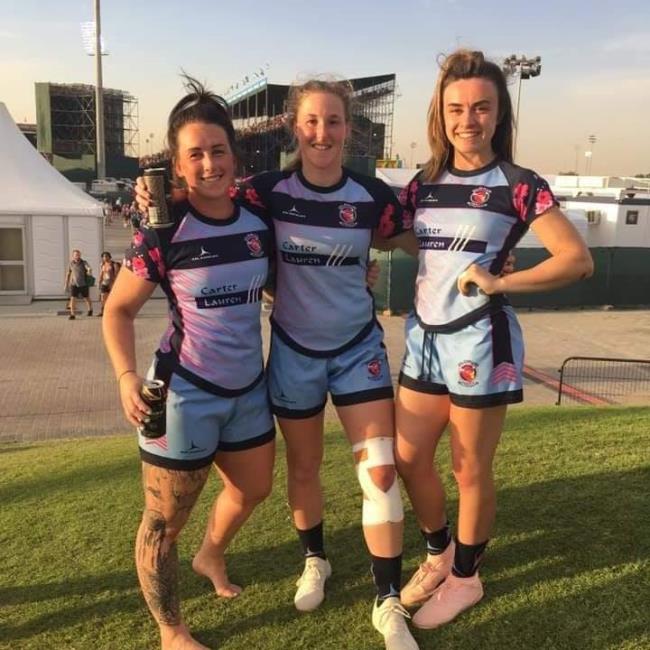
But at 32, Walsh can now look at sport with new found perspective. In May 2019, she helped organise a fundraising game for long time Whitland teammate Mari Griffiths, who had been diagnosed with lymphoma and has thankfully since recovered. And then earlier this year, she was one of many rocked by the news that Laura Setaro, the wife of Whitland outside half and women’s coach Nico, had also been diagnosed with breast cancer.
Again, Walsh was instrumental in showing support, and along with others arranged another charity campaign which involved club members spending a week of collectively running 404 miles a day. Ironic for a women who readily admits endurance running is not her strong point.
“Nico is a good friend and my heart went out to him and Laura, and their little girl Lily too.
“But I never usually run more than a mile at a time, I do my fitness work in Box and Burn in S7. So my body was in bits that week.
“I aimed for six miles on the first day so when my watch went off I thought I’d made it easily, then I realised it was set to kilometres not miles!
“But the whole thing was so uplifting and really put life into perspective. I’d wake up 6am in the morning and could see on our What’s App group that people had already been out. You had the likes of veterans like Dai Ebsworth smashing out miles every day and even Alice James and Elin Hywel, who were both about seven months pregnant.
“I was actually quite sad on the Monday morning when it all finished.”
But speaking of finishing, Walsh has no intention of ending her association whit Whitland anytime soon. It’s a club she now loves, and during this surreal lockdown period, has missed.
Amongst other things.
“We are accepted as a senior team in Whitland. The men’s team are great, we train on the same pitch and in the summer we join in with them for touch rugby.
“They’ve always been really supportive of us and that’s what I think equality in rugby is about.
“But right now I’m missing the team environment. I’m really looking forward to getting back to pre-season training and being the task master I am, have been setting out fitness sessions in our group chat. But that helps motivate me too because if I set them then I have to do them.
“I’ve missed simply going to the gym and seeing people too though. I have my own kit in the shed but since the 404 challenge it’s been difficult to get myself up for training.”
She can perhaps be forgiven for that. But I did wonder one thing.
With her parents, a sibling, aunties, uncles, and friends all so passionately involved in sport, not to mention a full time job with Travis Perkins, how does she escape from the intensity of it all?
Simply put, she doesn’t.
“In our family downtime means going out fishing. I’ve brought a kayak during lockdown so any chance I get I’m out on that. Truth be told I’ve hated having to stay at home.”
It’s that sentence that perhaps sums up her ethos.
Sport and family.
And no need to differentiate between the two, because for Natalie Walsh, they very much go together.
